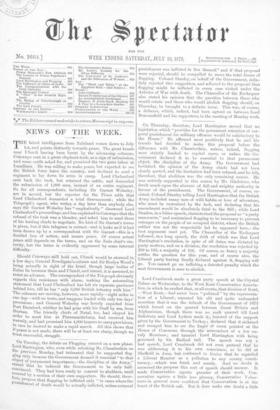On Thursday, therefore, Lord Hartington moved that no legislation which
"provides for the permanent retention of cor- poral punishment for military offences would be satisfactory to the House." He affirmed most positively that he and his friends had decided to make this proposal before the difference with Mr. Chamberlain, unless, indeed, flogging were strictly limited to capital cases, or unless the Go- vernment declared it to be essential to that paramount object, the discipline of the Army. The Government had hesitated, the opinion of the Army chiefs had not been clearly quoted, and the limitation had been refused, and he felt, therefore, that abolition was the only remaining course. He was entirely supported in this course by Mr. Gladstone, who dwelt much upon the absence of full and weighty authority in favour of the punishment. The Government, of course, re- sisted, Colonel Stanley telling Lord Hartingtou that the British Army included many men of wild habits or love of adventure, who must be restrained by the lash, and declaring that his amendment would be absolutely fatal to the Bill ; while Lord. Sandon, in a bitter speech, characterised the proposal as "a party manomvre," and maintained flogging to be necessary to prevent outrages oil the people of an occupied district, where the British soldier was not the respectable lad he appeared here,—the best argument used yet. The Chancellor of the Exchequer followed, in a long speech, the drift of which was that Lord Hartingtou's resolution, in spite of all dates, was dictated by party motives, and on a division, the resolution was rejected by 289 to 183, a majority of 106. Of course, so heavy a majority settles the question for this year, and of course also, the Liberal party having finally declared against it, flogging will go. You cannot go on inflicting a detested penalty which the next Government is sure to abolish.


































